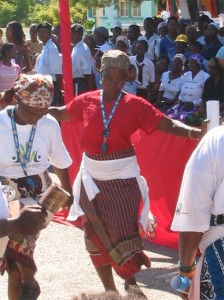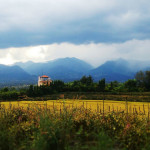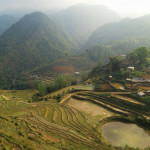The art of travel is exhilarating and romantic; it tests our endurance and provides us with the rare and often ephemeral chance to live outside of ourselves. Traveling shrinks the world exposing us firsthand to the best and worst of humanity, the grandest and most destitute of extremes.
Having traveled around Africa recently and before that Southeast Asia, I have found myself face to face with the harsh realities of the developing world. As a westerner, more specifically, as an American traveler, I have had the luxury of walking the divide between some of the most beautiful and relaxing resorts the regions had to provide and conversely, some of the most impoverished rural and urban communities, a true reflection of the experiences of the majority of the people in most of these regions.
I am an advocate for tourism that sustains and supports local communities. If you have ever wondered about life beyond the resorts, if you have ever longed for genuine interactions with the people in the communities within which you travel, here are some pointers on how to diversify your trip, shake things up a bit and leave a positive footprint.
1. Patron the Central Markets
A great way to get to know the community in which you are traveling is to visit the Central Market. Most destinations will have a central market of some sort where craftsmen and women gather to sell goods. The sights and sounds of these vibrant community meeting places alone are very unique. Central markets are a great way to familiarize yourself with the local culture and to interact with the members of the community. Be prepared to haggle and chances are you’ll walk away with some pretty fantastic gifts. The great thing is that this money is pumped directly into the community, directly into the pockets of the members of the community.
Central Markets are also a great way to get a feel for the food in your region of travel. Take the time to peruse the stands. Vendors are typically more than happy to talk to you about their produce, granted you speak the same language that is. I ate so well and inexpensively in Thailand, Malaysia, Swaziland and Mozambique this way. The passion fruit in Mozambique actually became an obsession of mine and I became really good friends with the lady whose passion fruit stand I visited almost everyday.
2. Seek out locally owned restaurants
Part of the allure of traveling to a new nook in the world is sampling the cuisine. When traveling to the developing world that can be scary because it is hard at times to know what you can and can’t eat. Many tourists make the mistake of eating only at resorts or ex-pat owned establishments where the food is not only familiar, but typically very safe. You can get some great food this way, food that reminds you of home and at times while abroad that can be very comforting; however to truly experience a culture through its cuisine, you’ve got to take the plunge. First you must get a sense of what you may and may not eat in the region you are staying in as a non-local, and then you’ve got to ask around. Ask the waiters and waitresses at the resort restaurants where they eat. Ask people at the central market where you can find a good locally owned restaurant. Many of my best meals were taken at locally owned establishments. It’s a great way to make sure that the community is positively being affected by tourism. All too often, tourist dollars don’t move very far past resorts, resorts which are typically owned by foreign entities.
Many Central Markets also have dining areas and restaurant stands. These are great for a quick snack or refreshments. And if you’re traveling on a budget, you get much more bang for your buck.
3. Patron community fair trade shops
Depending where you are in the developing world, there will most likely be a fair trade artisan shop, supported by a local NGO or nonprofit. Though typically more expensive than Central Markets, these places are a wonderland of authentic crafts and goods. I have found community fair trade shops in every country and region that I visited in both Southeast Asia and Africa. Most of these centers are located in areas heavily trafficked by tourists. All of the centers were backed by a local NGO or business. My favorite was a craft center/internet café/restaurant in the Cape Coast of Ghana, which was organized and assisted by Peace Corps volunteers. Not only did I get some great meals, but I bought some beautiful sculptures and prints as well.
4. Get involved, volunteer!
Volunteer vacations are growing in popularity. Wherever you go, particularly in the developing world, a helping hand is always needed. Depending on the length of your stay, you may volunteer at certain organizations from a weekend to a few months or even years. Research the charity organizations, non-profits and NGO’s in the region where you will be traveling prior to your departure. There are literally thousands of agencies and businesses that place and send volunteers overseas. It can even be as simple as google searching say “orphanages in Nepal” or “charities in Mexico City”. If possible, establish communication with potential organizations before you go. Volunteering is such an amazing way to honor your experience in another country. While in Ghana, I volunteered at an orphanage on the Cape Coast, while in Thailand, I volunteered with an organization doing Tsunami relief work and found myself painting fisherman boats, while in Mozambique, I volunteered at a local university where I led recycling workshops and assisted another NGO with their weekly community beach clean ups.
Typically all you need is the desire to help. I certainly didn’t have any experience working in orphanages, painting fishing boats or doing environmental clean-up. The work is intuitive and rewarding.
5. Check out the local culture
I find that there is an abundance of activities for a traveler to partake in that are rooted in the culture of the local community. Go and seek out community owned museums and exhibits. Seek out areas of interest. Find the concert halls or music events. Attend a sporting event frequented by locals. These are the moments that shrink the world and help us to appreciate and revel in the beauty and mysteries of other cultures. While we are patronage these events we are simultaneously pumping honest money into the local communities.
While in Thailand and Malaysia I visited museums and temples and sought out tours run by local groups. While in Ghana, I attended football matches, went to drumming performances on the beach, visited museums and slave forts, while simultaneously pumping money into the local community. In Southern Africa, there was no shortage of beautifully run locally owned museums and art spaces. These spaces can easily be overlooked but are a great way to experience the culture and art of the community in which you are traveling.
To truly travel, to seek to know the world, one must move beyond the familiar, beyond the comfortable and into the beautiful and sometimes to be honest, not so beautiful unknown. Resorts are lovely and restorative, they provide us with our own slice of the West set against the backdrop of the paradise of the developing world where oftentimes we are shielded from the desperate realities that are so prevalent just beyond their boarders.
Much of the developing world has felt the negative impact of Western influence, however as a new generation of travelers, we have the power to weave more positive interaction through our actions. Resorts are lovely, everyone should spend a moment or two in luxury, but traveling is about so much more than a luxury vacation, it is about heart, it is about experiencing, it is about leaving a positive footprint and giving back to the communities who have so graciously hosted you.








